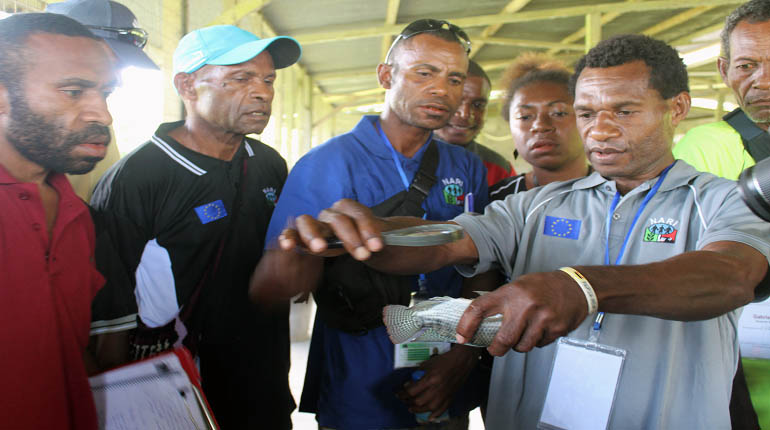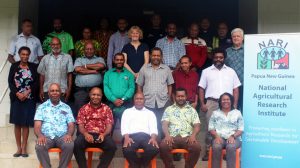Forty technical support staff In NARI participated in an in-house capacity building Workshop to not only develop their skills but also to address the challenges of staff capacity and delivery of projects in an effective and sustainable manner.
The project, ‘Strengthening food Production capacity and resilience to drought of vulnerable communities’ funded by the European Union staged the workshop at the Momase Regional Centre, Bubia from 13 to 17 July.
Technical staff from Southern Regional Centre, Laloki, Islands Regional Centre, Kerevat, Highlands Regional Centres in Tambul and Aiyura as well as the host centre Participated in the workshop.
The aim of the workshop was to enable staff to learn additional set Of skills and use them effectively towards achieving the institute’s Vision to realise agricultural research For sustainable development.
Over the years, the institute has Focused on post graduate and Other forms of exposure for its research staff along specific discipline Lines. The institute notes that some of Its staff has a wealth of experience Through on-the-job learning Or exposure in farmer training, Participation at events, on-farm trials, field visits and surveys Among others.
When welcoming the participants, Dr Sergie Bang, the Acting Director General said the EU climate resilience Project is a timely intervention To help vulnerable communities Who experienced the 2015-2016 drought with serious food Security issues among other challenges.
He said, “Thirty out of 87 districts In the country experienced severe Food shortages and even death.
He explained that the transfer of appropriate skills by staff to farmers Is essential for adoption.
Participants were reminded that the delivery of such skills is essential through the use of appropriate language to farmers.
Agriculture Systems Programme Director Dr Birte Komolong emphasized this at the close of the workshop and urged participants to make use of skills, shared experiences and knowledge at their respective centres.
Information and Knowledge Programme Director Laurie Fooks thanked participants saying other partners can help in delivering such training at the regional centres.
The need to multi-skill staff is essential as project implementations require multi-disciplinary approach in a timely and cost-effective manner. Skills taught throughout the workshop ranged from surface cleaning of crop materials using water and bleach; rapid seed multiplication of crops like taro, cassava, and sweetpotato using the mini-sett, mini
stem and node technique; soil sterilization, developing pig silage from sweetpotato tubers and vines; cost of building a mobile village chicken house, meeting dietary needs and maximizing profits on village chickens and eggs, distinguishing a male from a female tilapia; use of various
livestock feed mills; grooming goats and learning organizational and individual core values.
Dr Komolong said the way training is conducted is crucial for farmers to understand the information better.
She urged staff to make use of the skills, experience and knowledge gained from the workshop.
Bongi Masu of MRC Bubia thanked specialist staff for sharing their skills and experiences through various practical demonstrations.
He said he was able to share what he knew over years of working with livestock program. Simaima Kapi of Kerevat was pleased to have learnt a new set of skills, locating water source and setting up a rope and washer-pump.
Ms Kapi said skills in food processing will complement the workshops she gives on processing galip with women in East New Britain. Participants were given certificates at the close of the workshop.




